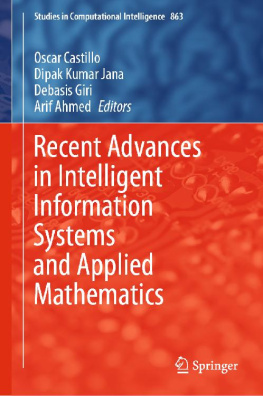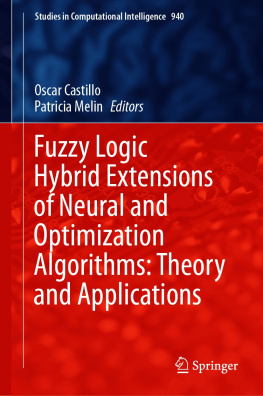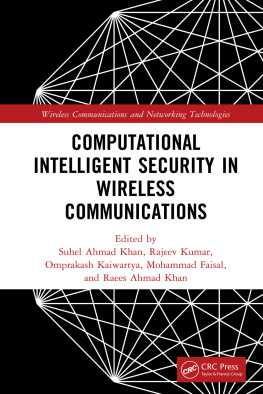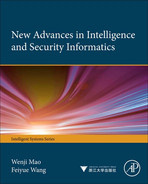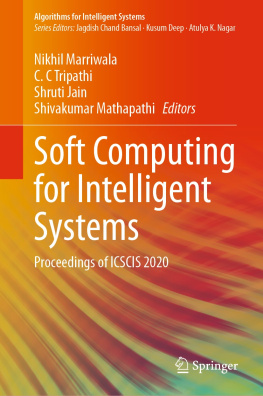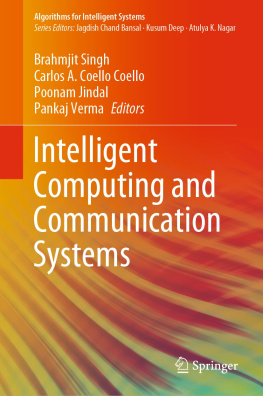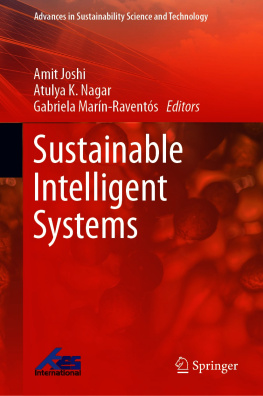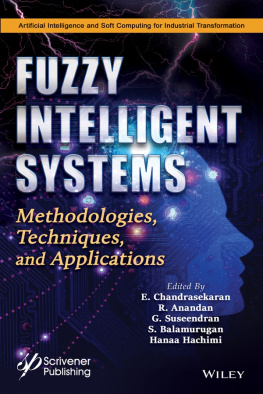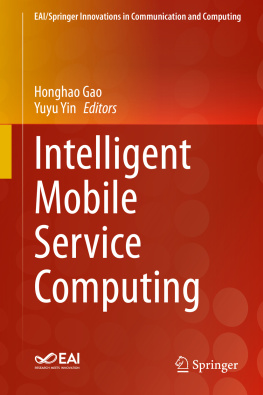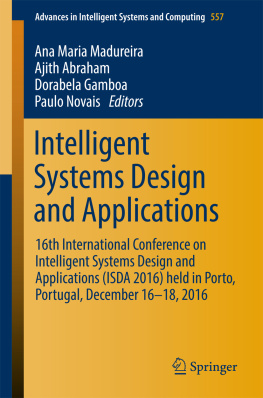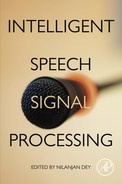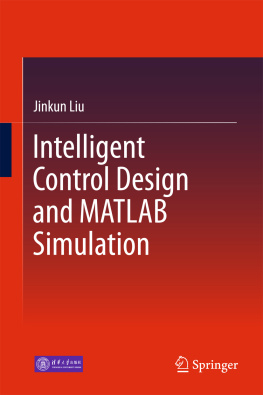Volume 863
Studies in Computational Intelligence
Series Editor
Janusz Kacprzyk
Polish Academy of Sciences, Warsaw, Poland
The series Studies in Computational Intelligence (SCI) publishes new developments and advances in the various areas of computational intelligencequickly and with a high quality. The intent is to cover the theory, applications, and design methods of computational intelligence, as embedded in the fields of engineering, computer science, physics and life sciences, as well as the methodologies behind them. The series contains monographs, lecture notes and edited volumes in computational intelligence spanning the areas of neural networks, connectionist systems, genetic algorithms, evolutionary computation, artificial intelligence, cellular automata, self-organizing systems, soft computing, fuzzy systems, and hybrid intelligent systems. Of particular value to both the contributors and the readership are the short publication timeframe and the world-wide distribution, which enable both wide and rapid dissemination of research output.
The books of this series are submitted to indexing to Web of Science, EI-Compendex, DBLP, SCOPUS, Google Scholar and Springerlink.
More information about this series at http://www.springer.com/series/7092
Editors
Oscar Castillo , Dipak Kumar Jana , Debasis Giri and Arif Ahmed
Recent Advances in Intelligent Information Systems and Applied Mathematics
Editors
Oscar Castillo
Division of Graduate Studies and Research, Tijuana Institute of Technology, Tijuana, Mexico
Dipak Kumar Jana
Haldia Institute of Technology, Haldia, West Bengal, India
Debasis Giri
Maulana Abul Kalam Azad University of Technology, Haringhata, India
Arif Ahmed
Haldia Institute of Technology, Haldia, India
ISSN 1860-949X e-ISSN 1860-9503
Studies in Computational Intelligence
ISBN 978-3-030-34151-0 e-ISBN 978-3-030-34152-7
https://doi.org/10.1007/978-3-030-34152-7
Springer Nature Switzerland AG 2020
This work is subject to copyright. All rights are reserved by the Publisher, whether the whole or part of the material is concerned, specifically the rights of translation, reprinting, reuse of illustrations, recitation, broadcasting, reproduction on microfilms or in any other physical way, and transmission or information storage and retrieval, electronic adaptation, computer software, or by similar or dissimilar methodology now known or hereafter developed.
The use of general descriptive names, registered names, trademarks, service marks, etc. in this publication does not imply, even in the absence of a specific statement, that such names are exempt from the relevant protective laws and regulations and therefore free for general use.
The publisher, the authors and the editors are safe to assume that the advice and information in this book are believed to be true and accurate at the date of publication. Neither the publisher nor the authors or the editors give a warranty, expressed or implied, with respect to the material contained herein or for any errors or omissions that may have been made. The publisher remains neutral with regard to jurisdictional claims in published maps and institutional affiliations.
This Springer imprint is published by the registered company Springer Nature Switzerland AG
The registered company address is: Gewerbestrasse 11, 6330 Cham, Switzerland
Preface
The 2nd International Conference on Information Technology and Applied Mathematics (ICITAM 2019) was held at the Haldia Institute of Technology, Haldia, from March 07 to March 09, 2019. Haldia is a city and a municipality in Purba Medinipur in the Indian state of West Bengal, and Haldia Institute of Technology is a premier institution training engineers and computer scientists for the past several years. It has gained its reputation through its institutional dedication to teaching and research.
In response to the call for papers for ICITAM 2019, 157 papers were submitted for presentation and inclusion in the proceedings of the conference. The papers were evaluated and ranked on the basis of their significance, novelty, and technical quality by at least two reviewers per paper. After a careful blind peer review, 70 papers were selected for inclusion in the conference proceedings. The papers cover current research in intelligent systems, soft computing, machine learning, natural language processing, image and video processing, computer network and security, cryptography, data hiding, rough set, fuzzy logic, operations research, optimization, uncertain theory, applications, etc. At ICITAM 2019, eminent personalities both from India and from all over the world (China, Mexico, USA, South Korea, Singapore, to just mention a few) participated, who deliver invited talks.
The speakers from India were recognized leaders in government, industry, and academic institutions like the Indian Statistical Institute (ISA) Kolkata, Indian Institute of Technology (IIT) Kharagpur, Indian Institute of Science Education and Research (IISER) Mohali, Indian Institute of Technology (IIT) Bombay, Vidyasagar University, etc. All of them are involved in research dealing with the current issues of interest related to the theme of the conference. The conference program included two keynote talks by Professor Oscar Castillo (Tijuana Institute of Technology, Mexico) and Professor Baoding Liu (Tsinghua University, Beijing, China) and ten invited talks.
A conference of this kind would not be possible to organize without the full support from different people across different committees. All logistics and general organizational aspects were looked after by the Organizing Committee members who spent their time and energy in making the conference a reality. We also thank all the Technical Program Committee members and external reviewers for thoroughly reviewing the papers submitted for the conference and sending their constructive suggestions within the deadlines. Our hearty thanks go to Springer for agreeing to publish the proceedings in its Advances in Intelligent System and Computing series.
We are indebted to Haldia Institute of Technology, Haldia, India, for sponsoring the event. Their support has significantly helped in raising the profile of the conference.
Last but not least, our sincere thanks go to all authors who submitted papers to ICITAM 2019 and to all speakers and participants. We sincerely hope that the readers will find the proceedings stimulating and inspiring.
Oscar Castillo
Dipak Kumar Jana
Debasis Giri
Arif Ahmed
Message from the General Chair
As we all are aware, mathematics has always been a discipline of interest not only to theoreticians but also to all practitioners irrespective of their specific profession. Be it science, technology, economics, commerce, or even sociology, new mathematical principles and models have been emerging and helping in new research and in drawing inferences from practical data as well as through logic. Past few decades have seen enormous growth in applications of mathematics in different areas which are multidisciplinary in nature. Artificial intelligence, fuzzy, and machine learning applications are such areas which have got more focus recently due to need of various emerging fields of applications. With emerging computing facilities and speeds, a phenomenal growth has happened in problem-solving area. Earlier, some observations were made and conjectures were drawn which remained conjectures till somebody either could prove it theoretically or found counter-examples. But today, we can write algorithms and use computers for long calculations, verifications, or generation of huge amount of data. With available computing capabilities, we can find factors of very large integers of the size of hundreds of digits; we can find inverses of very large-size matrices, solve a large set of linear equations, and so on. Thus, mathematics and computations have become more integrated areas of research these days, and it was thought to organize an event where thoughts may be shared by researchers and new challenging problems could be deliberated for solving these.

